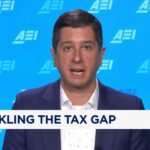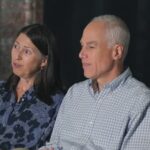
Sep 5, 2017 | News
“[Alex] Brill estimated that of all the money saved by local and state taxpayers with this deduction, 89 percent comes from those with incomes of $100,000 or higher. “In other words, the policy itself is highly regressive,” Brill told the Senate Finance Committee in prepared testimony Sept. 14. “It is available only to the minority of taxpayers who itemize their taxes (generally higher-income taxpayers) and is more valuable to taxpayers in higher tax brackets.””

Sep 1, 2017 | News
“[Alex Brill] emphasized that Congress’s tax reform timeline should not be dictated by attempts to ‘micromanage the quarter-by-quarter performance of the U.S. economy.’ Still, Brill acknowledged that it’s politically important to prioritize and maintain momentum on tax reform. ‘Moving slowly raises the risk that the process will never conclude,’ he said.”

Aug 31, 2017 | Interviews
“I see the speech yesterday as the president’s strongest commitment into engaging in this policy process…. We are eight months into the administration…. But I am hopeful this is the beginning, as the president said, the kick off I think of a concerted effort to move from the tax code we have to a kind tax code that republicans have been talking about for well more than a year now. One with a broader base and lower rates.”

Aug 28, 2017 | News
“‘I’m an advocate of a revenue-neutral carbon tax if the revenue raised is used to reduce or eliminate taxes that are most harmful to the economy,’ said Alex Brill of the American Enterprise Institute. ‘That would be a great trade,’ he said before adding that it is not something that is about to happen. ‘As a matter of politics, the environment for a carbon tax has not matured to the point that a majority of lawmakers are ready to embrace it,’ Brill said. ‘It would be premature for those who think a carbon tax is a good idea to try to chase the next legislative train,’ he said. And while there is a risk of trying to rush a carbon tax into the political process, there is also a risk in believing that a carbon tax is always going to be a long-term project, he added.”

Aug 18, 2017 | News
“Outside of the cost to local communities, experts have also linked the economic impact of the opioid crisis to rising insurance costs in both the private and public sector. A study by Matrix Global Advisors, a policy group based in Washington, D.C., shows that the cost of the opioid epidemic in Michigan costs every resident in the state about $84 a year. . . . ‘The healthcare costs associated with opioid abuse are the equivalent of an extra $84 in healthcare costs per Michigan resident every year,’ said Christy Robinson, Matrix Global Advisors director. ‘But determining who pays which part of the $84 is outside of the scope of our analysis.'”
















